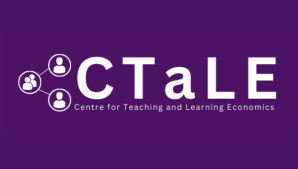Day 2, Thursday 29 June 2023
3pm-4.30pm BST//10am-11.30am EDT
Chair: Tim Burnet, Aston University
Speakers:
Implementing Identity formation and Asset Based learning from STEM in Economics
Sergio Barrera, Virginia Tech
Abstract
Similar to other areas of STEM, economics faces an underrepresentation of women and racial minorities compared to the US population. While other STEM fields have made significant efforts to reach a more diverse student body, economics has lagged behind in these efforts. In this presentation we highlight several examples of evidence-based practices gaining traction in STEM that can be used in economics classrooms to make the classroom more inclusive, engaging and encourage the persistence of underrepresented students. Specifically, we will highlight prominent theories in STEM education related to identity development and asset-based approaches to education. We will then discuss how popular evidence-based practices like team-based learning, multiple assignment types, culturally relevant pedagogy, encouraging self-efficacy and sense of belonging fit into these two STEM education frameworks. Finally, we will provide examples to show how we can practically use this framework to help all of our students succeed and enjoy economics. We believe that further understanding identity formation and asset-based approaches to education can help economists better understand these teaching practices and provide an underlying framework for how to organize teaching, assignments, and grading.
An Awarding gap analysis for the Queen Mary University of London
Daniela Tavasci, Queen Mary University of London
Abstract
This research aims to explore whether there were variations in awarding gaps within the BAME group at the School of Economics and Finance (SEF) within Queen Mary as reported for the sector by AdvanceHE (2021). The analysis of SEF data confirmed the existence of awarding gaps between various ethnic groups and between genders within these groups. More specifically it investigated the awarding gap further by exploring the tails of the distribution of marks by ethnic groups and the hypothesis that these might be influenced by undiversified (traditional and invigilated) assessments and subject-specific factors such as students’ performance in quantitative modules. SEF data indicated that diversified assessment types helped to reduce the gaps. This is in line with sector findings that indicate inclusive education practices and active learning reduces the gaps. This paper further explores recommendations for staff development: in particular, first, the challenges and opportunities of developing staff knowledge of the link between active learning and inclusive/diversified assessment to the gaps’ reduction through staff development channels (e.g. taught programmes such as PGCAP for example and workshops). Second, implementing processes that lead to inclusive practices identified as reducing the gaps; these might be: co-creation, peer assessment and feedback, group work, and learner reflection. This may be facilitated by developing an inclusivity rating which indicates the number of inclusive practices utilised in the curriculum. Third, adopting a hybrid approach that links awarding gap analytics to inclusive teaching practices. Fourth, adopting a specific institutional collection data approach to establish the extent to which specific ethnic groups’ and gender’ grades are being impacted and how this varies across programmes and even modules. Finally, it is essential to explore this across a variety of disciplines. This analysis looks at two variables: one is subject-specific (quantitative content) while the other one, suitable for all the subjects, concentrates on whether a diversified assessment reduces the gap. Further investigation of the link between inclusive curricula, specifically diversified assessment, and gaps need to be undertaken for other disciplines to explore the robustness of the results achieved in this analysis and enhance our understanding of the relationship between assessment and awarding gaps works.
Discovering Careers and Diversity in Economics Through Inter-Institutional Student Club Collaborative
Aselia Urmanbetova, Georgia Institute of Technology
Co-authors (in the alphabetical order): Alex Blecker; Jessica Dill; Megan Houck; Peter Kower; Perry Taylor ; Philip Vinson
Abstract
This paper outlines the organizational framework, experiences, and student feedback of the first of its kind collaborative among student economics clubs in the Atlanta area. Born from the initiative of the Economics Club of Atlanta (ECA) to connect with local student organizations during the time of pandemic-driven uncertainty and isolation, the Economics Collaborative in the Atlanta-area Academic Institutions (ECo3AI) brings together student leaders, faculty advisors and administrators, as well as economics professionals to brainstorm, build support networks, and shed light on the diverse landscape of careers open to economics majors. This initiative has also provided students with the tools and information to tackle standard milestones students face while progressing on their career paths, both in the private and public sectors. Building such connections and positive spillovers is critically important for URM and firstgen students. First, the paper outlines our group’s mission that can be broadly termed as “Discovering Economics” with a focus on careers and internship opportunities open to undergraduate economics majors, creating the initiative through organizing a collaborative effort among Atlanta area colleges and Universities and our structure and member institutions. Second, we describe the topics and questions raised, which organically lead the thematic evolution of our events. Lastly, we share our leaders’ group experiences as well as student feedback that emphasizes the importance of inter-institutional and extra-curricular initiatives for students and professionals in economics and economics-related fields to stay connected and supported. The ECo3AI has five participating institutions. We have organized and presented six events hosted by institutions for both in-person and virtual audiences.
